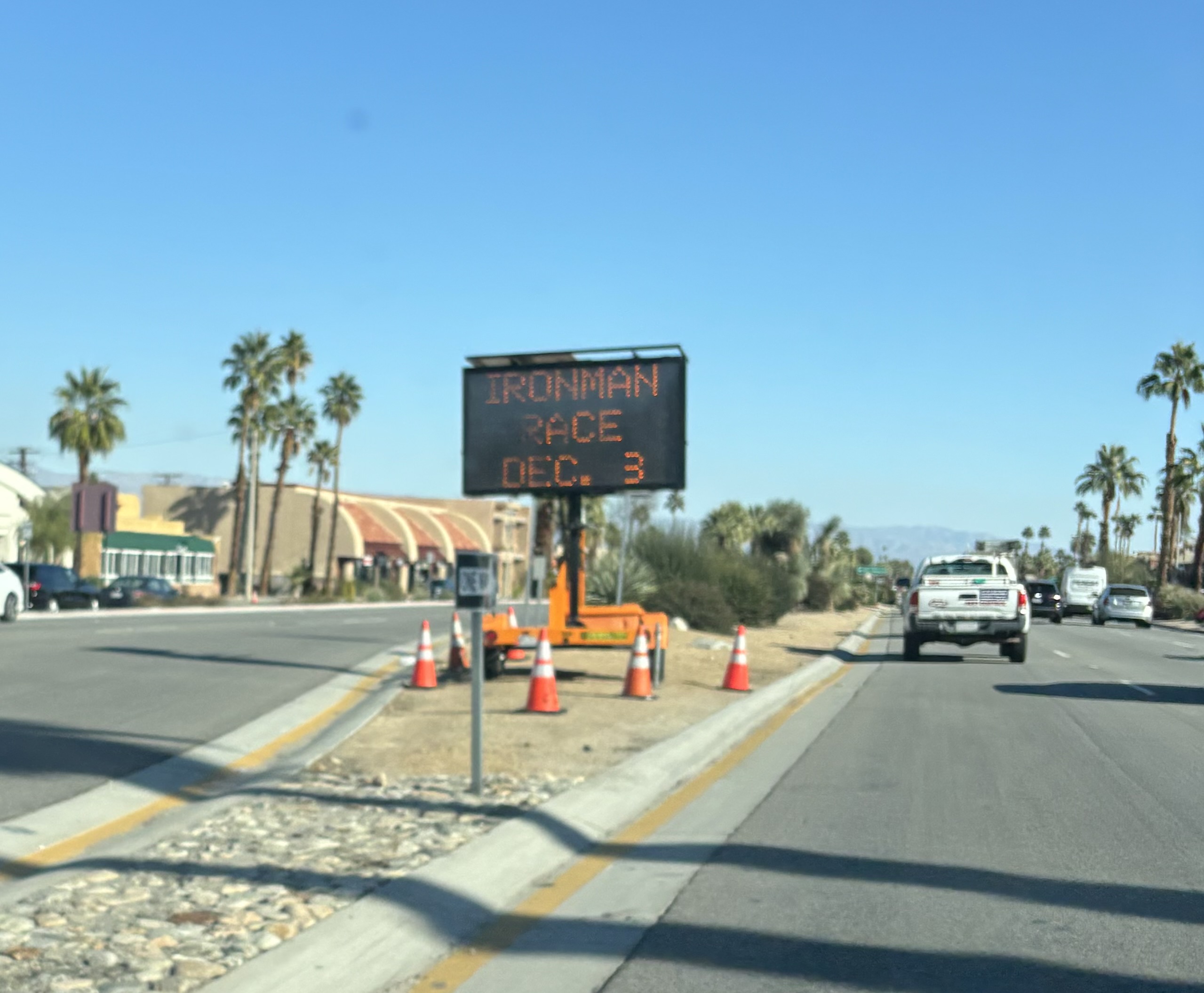Social media is full of signaling. “Look what I cooked!” “Look what I ate!”
I’ve done my fair share of posting when I’m proud of my accomplishments. Last year around this time I posted about how I finished my first Ironman triathlon.
But if we’re being honest, life brings more disappointment than success. Since our culture celebrates winners, we don’t share nearly as many stories about disappointment. So we often miss opportunities to learn from failure. Sports and business magazines celebrate the winners; I can’t remember too many articles in Sports Illustrated, Forbes, Inc, or Fast Company that cover the vast majority of people who didn’t make it. And it’s a shame, because they have the most powerful lessons to teach.
So today I’ll write about one of my own misadventures. As Toni Morrison said, “write the book you want to read.”
This past weekend I suited up for my second Ironman triathlon. I didn’t have a great training season because Hurricane Hilary stirred up a lot of pollution where I live, and then unseasonable winds blew it around. There were weeks when outdoor training was not an option. I worked out in my garage with an air purifier.
In October I tried to defer my registration fee but my request was denied. So I made a go of it. I worked out as hard as I could. I included cross-training and added nearly 10 pounds of lean muscle mass. I’m in the best shape of my life. One month ago a blood test confirmed that I knocked my total cholesterol down by 80 points (!) since last year.
On Friday I showed up early and I was first in line to register.
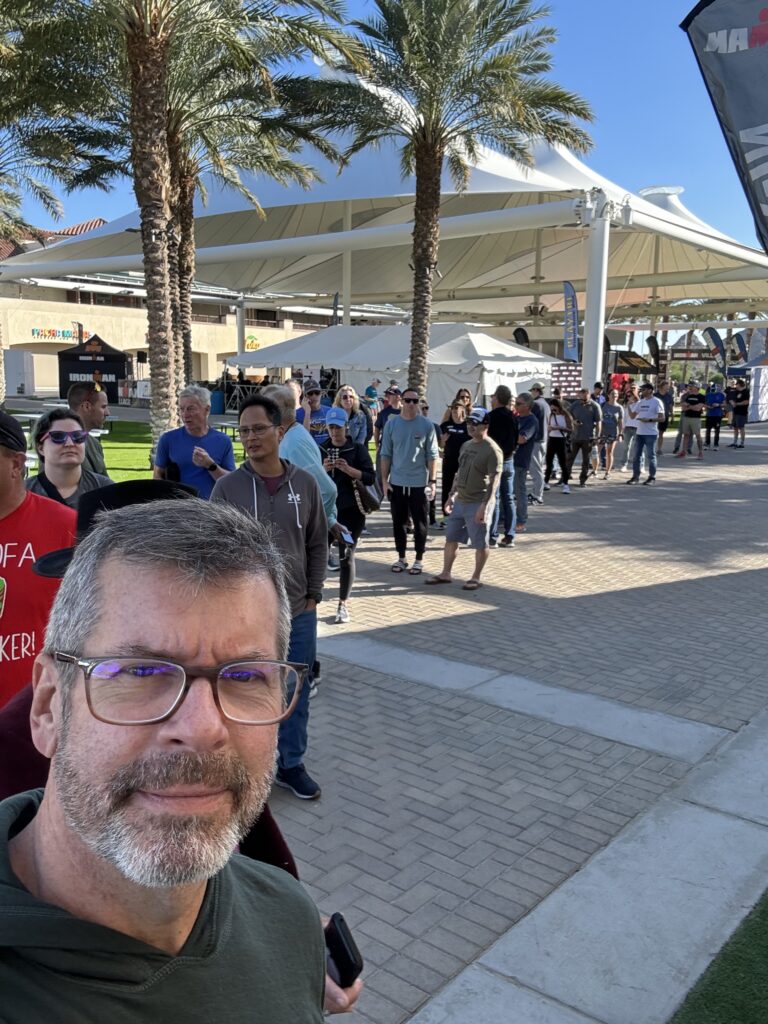
I got my daughter’s and my favorite number: 333.
Saturday I packed my gear and racked my bike.
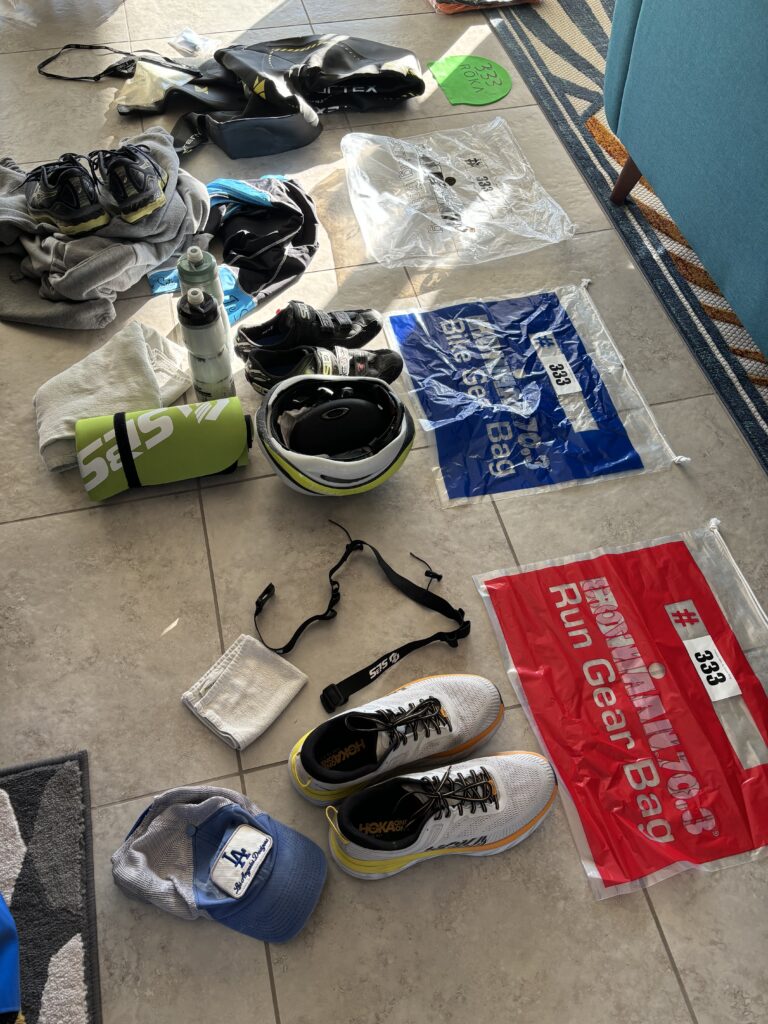
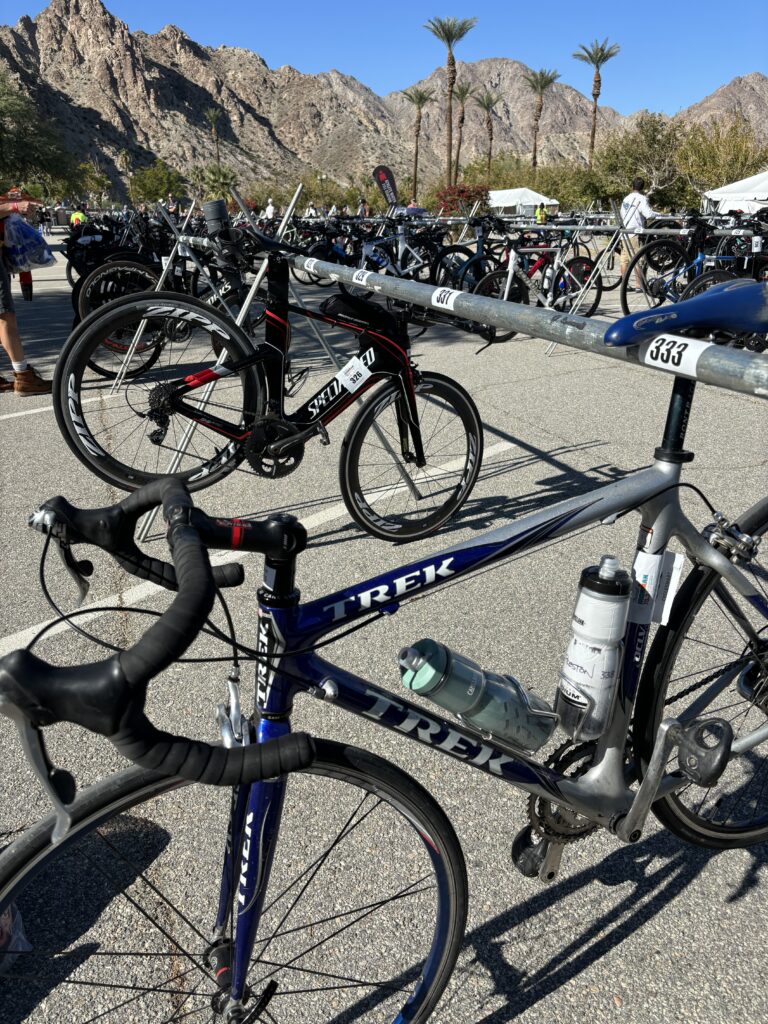
Race Day
Sunday morning I parked the car at 3:33 AM right near an exit and ANOTHER 3.
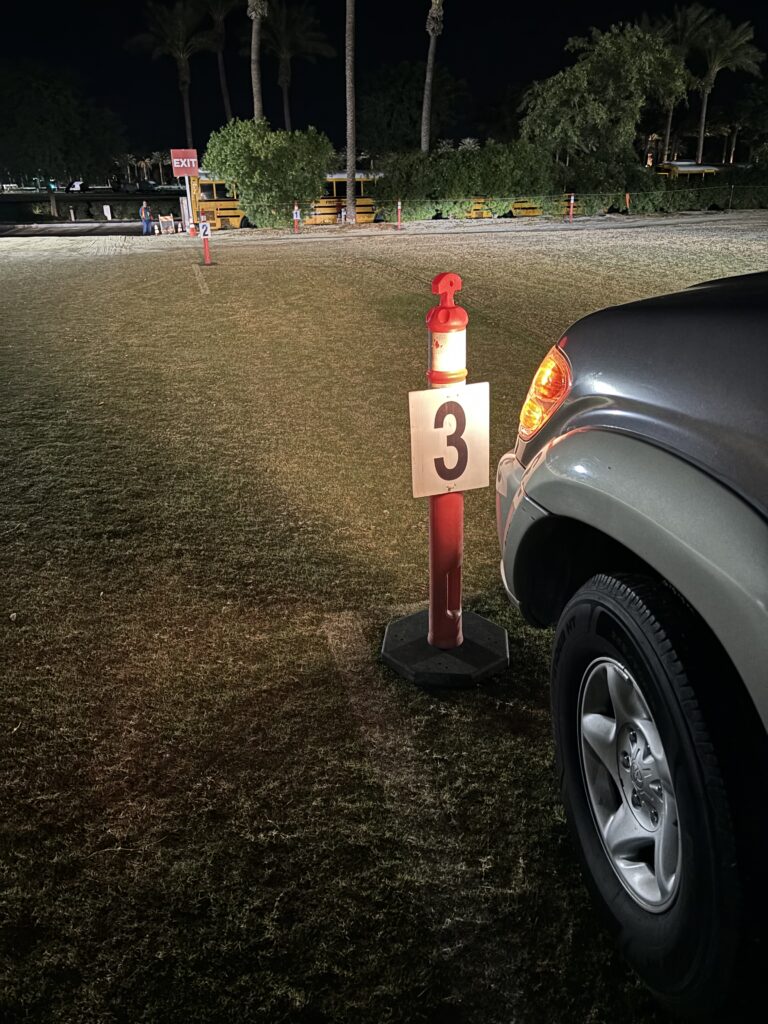
I was clearly on a roll. My travel mug of coffee was hot, my overnight oats were delicious, and my digestive system cooperated right on time. The sunrise was beautiful and I actually looked forward to the swim, which is my least favorite event.
As all 2400+ athletes stood on the beach waiting for the start, a woman in front of me coughed in a weird way. I asked her if she was OK. “Oh yeah,” she said, “Sorry. It’s just nerves. Right before every race I get this thing. Usually it’s just a weird coughing spasm but sometimes it turns into dry heaves. Don’t worry, I probably won’t puke on your feet.”
I flashed back to last year when I had a lot of anxiety starting the swim. That’s not unusual for Ironman participants. Open water swimming can be nerve-wracking. The water temperature in Lake Cahuilla is in the high 50s. Plus you have a ton of adrenaline working you up to the moment of truth.
But this time I felt GREAT! I ran into the water with no hesitation and I got right into my stroke. Normally I feel like the slowest swimmer out there, but I even passed a few swimmers in front of me. I felt stronger than ever as I headed toward the first right turn at the far end of the lake.
Suddenly I couldn’t breathe.
I’ve had asthma my whole life. I take a preventative inhaler twice a day when it’s windy. My rescue inhaler was waiting for me in the transition area after the swim.
I didn’t make it. I don’t get them often anymore, but I know an asthma attack when I feel one, and this one was a doozy.
When I felt the first bronchial spasm tighten my airway I slowed my breathing and my heart rate. I did some breast strokes and I kept my head above the water for a couple minutes. One of the race stewards noticed me and paddled over. I put a hand on her kayak (which is legal as long as you’re not making forward progress) and checked in with myself. As in, I literally asked myself how I was doing. After a few seconds I decided to continue. I let go of the kayak and kept going.
Past and Future Shape the Present
Growing up in Los Angeles, I hated feeling limited because of my asthma. When it was smoggy I couldn’t even play outside. I had to sit in the office during recess. As a young adult, I overcompensated by punching way above my weight class. Being told I couldn’t do something was the best motivation. I was the first one in the gym and the last one to leave. Whatever I didn’t have in terms of height, weight, or lung capacity, I made up for with grit.
On my first day of high school basketball practice, future UCLA Bruin and Los Angeles Laker Trevor Wilson – who was already a chiseled 6’7″ monster when he was 17 – tried to jump over me for a dunk. I yanked his shorts down, undercut him, and ran to the other end of the court, where I wondered if the coach would blow the whistle before Trevor killed me. (We eventually became friends, but that’s a blog post for another day.)
I mention my past because there was a time when I had everything to prove and nothing to lose. Back then I didn’t understand the risks and/or I didn’t care. I would be damned if I didn’t finish what I started.
Now I’m in my fifties. At least once a year I see headlines about morons who die chasing a summit. Don’t give me that crap that they died doing something they loved. They saw the weather, they may even have diagnosed their own high altitude pulmonary edema in real time, and then they made a preposterously bad decision. Somehow they rationalized their thinking: “It’s just a few more steps…”
About 10-15 strokes after I left the kayak, my lungs locked up again, this time even tighter than before.
No sporting event or adventure excursion is worth self-harm. Besides, I am accountable to the most important person in my life. When I started racing triathlons I promised my wife I wouldn’t be a moron. Now it was time to keep my promise. I couldn’t breathe and it was getting worse. Carrying on at that point meant doing damage.
My imagination started writing alternative futures: How would I feel the next day if I stopped, kept my word, and stayed healthy? How would I feel if I continued, persevered, and injured myself permanently in the attempt? How would I feel if I drowned and became the sort of moron I ridiculed just a couple paragraphs ago?
Just a few dozen yards after I left the kayak, I couldn’t inhale strongly enough to get oxygen and I couldn’t exhale strongly enough to make room for my next breath. I swam wide to the left and raised my hand. I was done for the day.
In Reflection
The whole experience sucked. Apart from the physical discomfort, I hated feeling like that asthmatic kid again. Or like I was giving up. Or like I wasted a bunch of time and money for nothing.
Q: But what is it I actually trained for? What do I want to prove? A: I want to be strong enough in all circumstances to make good decisions. There is a bigger picture here.
As soon as I got out of the water I borrowed someone’s phone to call my wife. I didn’t want her to see my now-confiscated time chip inexplicably standing still on the Ironman tracker app. I left her a message and started trying to figure out how to get my gear and my bike out of the transition areas on the way back to my car.
That process took three hours. I had time to reflect. I considered what a Stoic might say: “You stopped breathing and you made a decision so you could breathe again. And…?” There is really nothing else to it.
When I got home I gave my wife the gift of not being in a crappy mood. I took advantage of the time I didn’t expect to have and I wrote some material for LIT AF.
Monday I got back into the gym and back on my bike. Whatever caused the asthma attack out there in the lake, I’m breathing just fine now, and I’m resolved to make tomorrow better than today. Tomorrow I’ll swim. Every day I get the chance to make myself stronger. I train whether or not I race. Process over results.
Whatever adventures you undertake, try to remember that the events themselves are less impressive (literally, as in they make less of an impression) than the meanings you assign to them. I traded a finisher’s medal for good health and an opportunity to practice sound decision-making. If all that hadn’t happened, neither would this blog post.
Sometimes failure is the best way to succeed.
